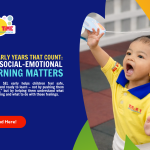Before You Say No to Preschool…
Does my child really need to go to preschool before entering primary school? After all, we all know someone who skipped it and still turned out just fine, right?
But preschool today is no longer just about playtime or learning ABCs. It’s a foundation—a stepping stone that helps young children grow socially, emotionally, and cognitively so they’re ready for what’s next. In this blog, let’s take a warm, clear-eyed look at why early learning matters before the big leap to Grade 1.
1. It’s Not Just Play: It’s Brainwork in Disguise
Preschool is where learning begins through play. It’s the magical setting where children explore letters, numbers, patterns, and colors through blocks, stories, songs, and hands-on games. These activities might look simple, but they spark powerful cognitive growth.
By the time they enter elementary school, children who have attended preschool often have stronger pre-reading skills, better basic math awareness, and sharper memory and focus. Their brains are wired and warmed up for the academic challenges ahead.
“Play is the highest form of research.” – Albert Einstein
2. Social Butterflies & Tantrum Tamers: Emotional Readiness
You might think being able to count or recite the alphabet is the big goal, but emotional readiness plays a much bigger role when transitioning to primary school. In preschool, children learn to:
- Wait their turn
- Share materials
- Listen to others
- Express emotions with words
- Manage small frustrations
These social-emotional milestones help children adjust to larger classroom settings, make friends, and respond well to teachers. In short, they’re not just learning what to think, but how to be.
3. Language, Conversation, and Confidence
Preschool is a language-rich environment. Whether they’re acting out a story in dramatic play, asking questions during circle time, or singing along with friends, children absorb new words, improve sentence structures, and learn how to express thoughts clearly.
This kind of communication builds a strong foundation for reading, writing, and engaging in group learning at the primary level.
4. Routine, Structure, and Independence
Preschool also teaches routines—how to line up, pack up, clean up, follow a schedule, and take responsibility for belongings. Children build independence and feel more confident when faced with the longer hours and academic structure of primary school.
These day-to-day skills often go unnoticed but play a major role in school readiness.

5. What About Reading Before Grade 1?
A hot topic among parents? Sure. Some believe children must be able to read fluently before primary school. But experts agree: children develop at different rates, and pushing early reading before they’re ready can backfire.
What matters more is that children:
- Recognize letters and their sounds
- Show curiosity about stories and books
- Understand how print works (left to right, top to bottom)
These early literacy skills are what preschool nurtures, gently and developmentally.
Building the Whole Child
Above all, preschool sees your child as a whole person. It doesn’t just prepare them to write their name or count to 20—it prepares them to solve problems, navigate emotions, form relationships, and feel joy in discovery.
And when children feel safe, supported, and stimulated in those early years, they’re more likely to thrive in the years ahead.
References
- School readiness: Transition from preschool to grade school | Encyclopedia on Early Childhood Development
- What Does the Research Really Say About Preschool Effectiveness? | Learning Policy Institute
written by Shandy Lwieka,
Tutor Time Indonesia




